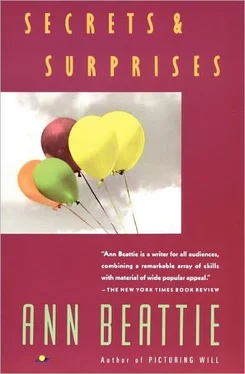“I don’t want to tell you.”
“Why not?”
“I can’t talk anymore right now,” she said. “I want to get some air.” She hung up.
He needed air too. He felt panicked, the way he had the day she was in the swing, when she said, “I’m going to jump!” and he knew it was going much too fast, much too high — the swing flying out over a hill that rolled steeply down to a muddy bank by the creek. He had had the sense to stop pushing, but he only stood there, waiting, shivering in the breeze the swing made.
He went out quickly. Park Street — somewhere near there. OK, he would find her. He knew he would not. There was a cab. He was in the cab. He rolled down the window to get some air, hoping the driver would figure he was drunk.
“What place you looking for again?” the driver said.
“I’m looking for a person, actually. If you’d go slowly …”
The cabdriver drove down the street at ordinary speed, and stopped at a light. A family crossed in front of the cab: a young black couple, the father with a child on his shoulders. The child was wearing a Porky Pig mask.
The light changed and the car started forward. “Goddamn,” the driver said. “I knew it.”
Steam had begun to rise from under the hood. It was a broken water hose. The cab moved into the next lane and stopped. Robert stuffed two one-dollar bills into the driver’s hand and bolted from the cab.
“Piece of junk!” he heard the driver holler, and there was the sound of metal being kicked. Robert looked over his shoulder and saw the cabdriver kicking the grille. Steam was pouring out in a huge cloud. The driver kicked the cab again.
He walked. It seemed to him as if he were walking in slow motion, but soon he was panting. He passed several telephone booths, but all of them were empty. He felt guilty about not helping the cabdriver, and he walked all the way to McHenry’s. He thought — and was immediately struck with the irrationality of it — that New Haven was really quite a nice town, architecturally.
Penelope was not at McHenry’s. “Am I a black dude?” a black man said to him as Robert wedged his way through the crowd at the bar. “I’m gonna ask you straight, look at me and tell me: Ain’t I a black dude?” The black man laughed with real joy. He did not seem to be drunk. Robert smiled at the man and headed toward the back of the bar. Maybe she was in the bathroom. He stood around, looking all over the bar, hoping she’d come out of the bathroom. Time passed. “If I was drunk,” the black man said as Robert walked toward the front door, “I might try to put some rap on you, like I’m the king of Siam. I’m not saying nothing like that. I’m asking you straight: Ain’t I a black dude, though?”
“You sure are,” he said and edged away.
He went out and walked to a phone booth and dialed Dan’s number. “Dan,” he said, “I don’t want to alarm you, but Penelope got a little loaded tonight and I went out to look for her and I’ve lost track of her.”
“Is that right?” Dan said. “She told me she was going to sleep over at Marielle’s.”
“I guess she was. It’s a long story, but she left there and she got pretty wrecked, Dan. I was worried about her, so—”
“Listen,” Dan said. “Can I call you back in fifteen minutes?”
“What do you mean? I’m at a phone booth.”
“Well, doesn’t it have a number? I’ll be right back with you.”
“She’s wandering around New Haven in awful shape, Dan. You’d better get down here and—”
Dan was talking to someone, his hand covering the mouthpiece.
“To tell you the truth,” Dan said, “I can’t talk right now. In fifteen minutes I can talk, but a friend is here.”
“What are you talking about?” Robert said. “Haven’t you been listening to what I’ve been saying? If you’ve got some woman there, tell her to go to the toilet for a minute, for Christ’s sake.”
“That doesn’t cut the mustard anymore,” Dan said. “You can’t shuffle women off like they’re cats and dogs.”
Robert slammed down the phone and went back to McHenry’s. She was still not there. He left, and out on the corner the black man from the bar walked up to him and offered to sell him cocaine. He politely refused, saying he had no money. The man nodded and walked down the street. Robert watched him for a minute, then looked away. For just a few seconds he had been interested in the way the man moved, what he looked like walking down the street. When he had lived at the house with Penelope, Robert had watched her, too; he had done endless drawings of her, sketched her on napkins, on the corner of the newspaper. But paintings — when he tried to do anything formal, he hadn’t been able to go through with it. Cyril told him it was because he was afraid of capturing her. At first he thought Cyril’s remark was stupid, but now — standing tired and cold on the street corner — he had to admit that he’d always been a little afraid of her, too. What would he have done tonight if he’d found her? Why had her phone call upset him so much — because she was stoned? He thought about Penelope — about putting his head down on her shoulder, somewhere where it was warm. He began to walk home. It was a long walk, and he was very tired. He stopped and looked in a bookstore window, then walked past a dry cleaner’s. The last time he’d looked, it had been a coffee shop. At a red light he heard Bob Dylan on a car radio, making an analogy between time and a jet plane.
She called in the morning to apologize. When she hung up on him the night before, she got straight for a minute — long enough to hail a cab — but she had a bad time in the cab again, and didn’t have the money to pay for the ride … To make a long story short, she was with Marielle.
“Why?” Robert asked.
Well, she was going to tell the cabdriver to take her to Robert’s place, but she was afraid he was mad. No — that wasn’t the truth. She knew he wouldn’t be mad, but she couldn’t face him. She wanted to talk to him, but she was in no shape.
She agreed to meet him for lunch. They hung up. He went into the bathroom to shave. A letter his father had written him, asking why he had dropped out of graduate school, was scotch-taped to the mirror, along with other articles of interest. There was one faded clipping, which belonged to Johnny and had been hung on the refrigerator at the house, about someone called the California Superman who had frozen to death in his Superman suit, in his refrigerator. All of Robert’s friends had bizarre stories displayed in their apartments. Cyril had a story about a family that had starved to death, in their car at the side of the highway. Their last meal had been watermelon. The clipping was tacked to Cyril’s headboard. It made Robert feel old and disoriented when he realized that these awful newspaper articles had replaced those mindless Day-Glo pictures everybody used to have. Also, people in New Haven had begun to come up to him on the street — cops, surely; they had to be cops — swinging plastic bags full of grass in front of his nose, bringing handfuls of ups and downs out of their pockets. Also, the day before, he had got a box from his mother. She sent him a needlepoint doorstop, with a small white-and-gray Scottie dog on it, and a half-wreath of roses underneath it. It really got him down.
He began to shave. His cat walked into the bathroom and rubbed against his bare ankle, making him jerk his leg away, and he cut his cheek. He put a piece of toilet paper against the cut, and sat on the side of the tub. He was angry at the cat and angry at himself for being depressed. After all, Dan was out of the picture now. Penelope had been found. He could go get her, the way he got groceries, the way he got a book from the library. It seemed too easy. Something was wrong.
Читать дальше












